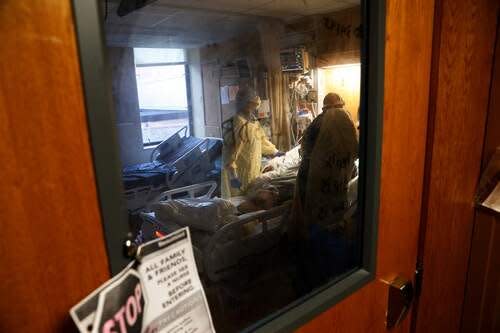You are here
U.S. residents are more likely to die from COVID-19 than persons in other high-income countries, data suggests
Primary tabs
U.S. residents are more likely to die from COVID-19 than persons in other high-income countries, data suggests
Wed, 2022-02-09 14:10 — mike kraft You're more likely to die from COVID-19 in the US than in other high-income countries amid omicron, data suggests More infections may lead to a rise in COVID-19 deaths, health experts say. Data shows the U.S. case fatality rate is among the highest in the world. YahooNews
You're more likely to die from COVID-19 in the US than in other high-income countries amid omicron, data suggests More infections may lead to a rise in COVID-19 deaths, health experts say. Data shows the U.S. case fatality rate is among the highest in the world. YahooNews Although the omicron variant of the coronavirus is less likely to cause severe disease compared with previously dominating strains, the USA is still experiencing more COVID-19 deaths than at almost any other point in the pandemic.
The country surpassed 900,000 deaths over the weekend and may reach a million by April, according to a USA TODAY analysis of Johns Hopkins data. About 2,400 deaths are reported each day.
Omicron’s increased transmissibility may be partly to blame for a rise in deaths, health experts said, but data showing the U.S. case fatality rate is one of the highest in the world suggests there’s more to the story.
The U.S. case fatality rate – the ratio between confirmed deaths and confirmed cases – has decreased from 1.63% since the height of the delta wave on Sept. 1 to 1.18% as of Feb. 6, according to Our World in Data.
Though the country’s case fatality rate during the delta wave was below other high-income countries, it’s now among the highest. Health experts worry the USA may be falling behind the progress against the virus made by other countries.
“Overall, there are fewer deaths per infection that are occurring, even in the U.S., but the numbers aren’t as good as we’ve seen in other parts of the world,” said Andrew Pekosz, a virologist and professor at Johns Hopkins Bloomberg School of Public Health.
Low vaccination and booster rates, lack of coronavirus testing and consequences from an imperfect health system have stunted U.S. progress in the pandemic, leading to more COVID-19 deaths and a higher case fatality rate, health experts said.
The Centers for Disease Control and Prevention reported about 64% of Americans are fully vaccinated against COVID-19, trailing Canada, which boasts a vaccination rate of nearly 80%, according to Our World in Data.
The vaccines are not meant to prevent all infections, but they do “a great job” protecting against severe illness and death, said Chris Dickey, director of global and environmental health at New York University’s School of Global Public Health.
“It is true that other countries seem to have lower case fatality ratios, and a lot of that is attributable to the difference in vaccinations and, most importantly, boosters,” he said.
As of Monday, the CDC reported, 42% of eligible Americans had received a booster, about 27% of the total population, Our World in Data said. This pales in comparison with Denmark and the United Kingdom that report booster rates of more than 61% and 54%, respectively. ...

Recent Comments